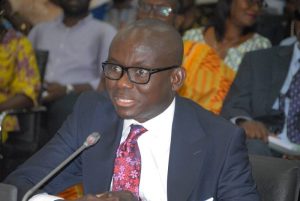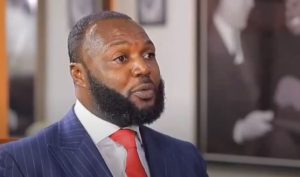South Dayi MP, Rockson Nelson Dafeamekpor, is unhappy with the Attorney General and the Minister of Justice describing his letter to parliament over the House’s resolution to the General Legal Council for the admission of some students into the Ghana School of Law as one that is bad taste.
The AG, Godred Yeboah Dame, has said parliament usurped its powers in directing the GLC to admit the 499 LLB students who were denied admission into the Law School despite making the 50 percent pass mark.
But the MP believes the AG, in particular, erred in averring that parliament has no such authority, adding that the manner in which the letter was written to parliament was rather condescending.
“We passed a resolution, so one cannot just say that resolutions from parliament have no legal effect. We were very clear giving a direct order and a consequential order. We had directed the Minister of Justice, that is why his letter to Parliament is a very pathetic one for the AG to speak to Parliament in this tone”, Mr. Defeamekpor said on the Point of View on Citi TV.
He further mentioned that the Minister’s response was needless and unfortunate, especially when the Office of the Attorney General had failed to intervene in the student’s admission processes.
“We have oversight over him [AG] and he has oversight over the GLC, and for almost a month he has refused to act. So we have directed him that he should act, and then he writes to Parliament. So with what he has done, it is needless to create this attrition between his office and Parliament. It is a very unfortunate letter to parliament in this tone.”
Parliament had directed the General Legal Council to admit the students who, despite making the 50 percent pass mark, were denied admission.
The directive was given after Parliament debated and passed a resolution directed at the Minister of Justice and Attorney General and the General Legal Council to the effect that the students should be admitted.
However, according to the Office of the Attorney General, Parliament cannot direct the GLC on processes for admission into the law school just by a resolution.
In a statement, the AG’s office mentioned that: “the capacity of the Executive, not the Legislature, through the Minister responsible for the General Legal Council, i.e. the Attorney-General and Minister for Justice, to direct and advise the Council on major matters of national importance.”
But Mr. Defeamepkor, who is also a member of Parliament’s constitutional and Legal Affairs, Committee, said, “Article 103, clause 3 states that committees of parliament can be charged with such functions including the investigation, inquiry into the administration of the activities of Ministries and departments, and such investigations may require extent to proposals for legislation. When parliament sits at the plenary and takes a decision, that is a committee on the whole”, he added.
Kofi Abosti disagrees
Meanwhile, the Dean of the University of Professional Studies, UPSA, Prof. Kofi Abosti is of a different view.
He says although Parliament has a role in resolving the law school matters, its approach of directly ordering the GLC without engaging the Attorney General is wrong and incomprehensible.
“This reflects the issue of processes. In this instance, parliament is exercising its mandate of oversight, but the way parliament is going about it is very problematic in my opinion because parliament’s mandate of oversight is clearly defined. The GLC is not autonomous. It still falls under an agency of state. Ultimately, the AG has a seat at the GLC, and he could have been invited to parliament for questioning.”
“So ultimately Parliament is not without the authority and capacity to bring some influence to bear in respect to what is happening. As a lawyer, I have not come across an instance where Parliament will issue a direct order to a statutory body. So in my simplistic view, parliament has chosen a path that is unknown to me”, he argued.







